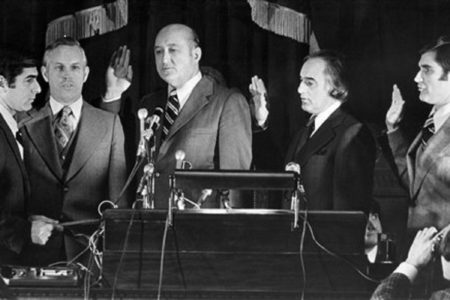I loved Bob Crane.
He was the state treasurer for 26 years, and in the 27 years since he left office, there have been five state treasurers, mostly because they all had big egos, and they wanted something more, because didn’t know how good they had it, thanks mainly to Robert Quentin Crane.
They were lucky, in other words, but they didn’t appreciate it. That was one thing about Bob Crane, who died Thursday at the age of 91 – he was one lucky guy, and he knew it.
And we were all lucky to know Bob Crane. As the late talk-show host Jerry Williams used to say of him, “Not a bad guy!”
Crane became treasurer in 1964, because he’d been lucky enough to go to Boston College (and I think before that Boston English) with John Driscoll, who was then the treasurer. The problem for Driscoll was, in those days a treasurer could only serve three two-year terms – six years in all.
Driscoll was bumping up against the limit, so when the job of Turnpike chairman opened up, Driscoll grabbed it. But before he announced he was resigning as treasurer, Driscoll tipped off his classmate Crane, and Crane rounded up enough votes in the legislature to get the job.
The first thing Bob did once he was in office was to get his pals in the General Court to do away with the three-term limits. Then he got the boys to increase the treasurer’s term of office to four years.
And he was off and running.
In the early 1970’s, Crane got lucky again. The legislature was setting up something called the State Lottery Commission. Normally, the Lottery would have been controlled by the governor, but the governor was a Republican, Frank Sargent. C’mon down again, Bob!
At the annual St. Patrick’s Day breakfast in South Boston, Senate President Billy Bulger always used to introduce him as “the biggest bookie in Massachusetts.” Which he was.
And that brings us to perhaps the luckiest moment of his political career, in 1991, ironically enough a few months after he had left office. Billy Bulger’s gangster brother Whitey “won” Mass Millions. And Bob Crane wasn’t treasurer. He couldn’t believe his great fortune.
“Thank God!” he said. “Thank God it’s not my fault!”
When James Michael Curley’s last surviving son was down and out, guess who took care of him? Bob always did the right thing. His State House office was above the arch, and he could look out and watch everybody walking in to work from Bowdoin Street.
I remember one morning, it must have been 1984, I was trudging into the State House, a little down. I’d read in the morning paper that I was getting fired from my job at Ch. 7. As I reached the arch, I heard a knock on the window above, and I looked up. It was Bob, motioning me to come upstairs.
“Don’t worry about a thing, kid,” he told me. “You’ll be okay.”
As it turned out, I was. He didn’t know, but he just wanted to make me feel a little better.
When he was the state rep from Brighton, Bob lived on Burton Street, the last street before Ward 22 turns into Newton. But Crane was Boston all the way. There was a classic Beacon Hill saying attributed to him, which he always denied, but I believe he said it, because it sounds so much like him:
“When the boys from the suburbs go home, the boys from Boston go to work.”
So many memories… his musical group, the Treasury Notes… the recount on his 1960 primary loss to a guy named John Cort, and the recount after the ballots were stashed in the basement of Presentation parish… staring down Ted Kennedy in 1976 when he demanded that Bob give up the treasurer’s job to make way for Ted’s callow 24-year-old nephew Joe… his days as chairman of the Convention Center Authority, doing favors for Billy Bulger, rolling his eyes and saying, “This is for the little man upstairs.”
Every year on St. Patrick’s Day at Halitosis Hall, the little man upstairs would ask Crane what Irish song he wanted to sing. Usually he’d say “Dear Old Donegal,” an old Bing Crosby tune about a son of Erin arriving in the US:
“There wasn’t a soul to greet me there/ A stranger on your shore/ But Irish luck was with me here/ And riches came galore.”
Like I said, Bob was a lucky guy, and he was one of the rare lucky guys who knew it, and appreciated his Irish luck.
I remember once a few years ago, he told me about how he arrived at the State House in 1957, at the age of 32.
“I looked around and I said to myself, ‘This is the place for me!’” he said. “When I started out, you know, I was always the youngest guy in the group. Now….” He shook his head sadly. “Now….”


